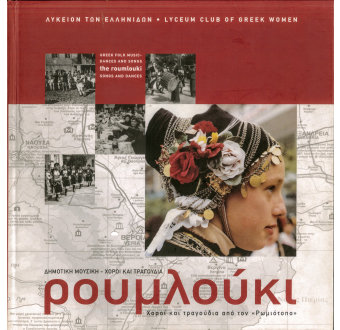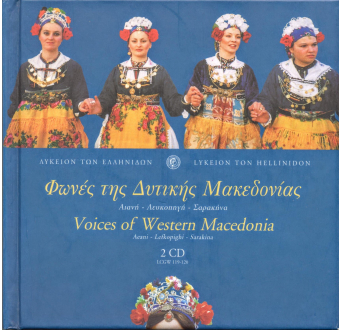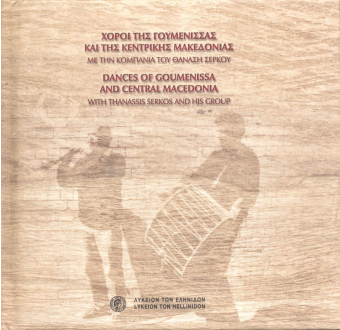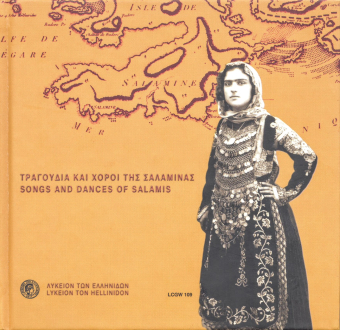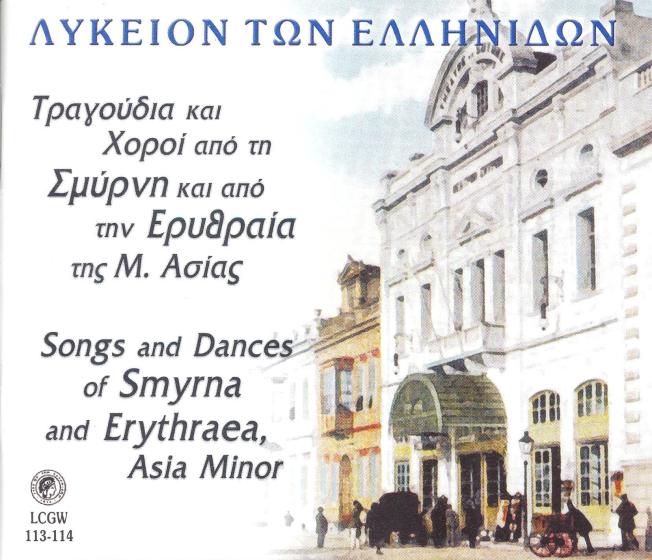
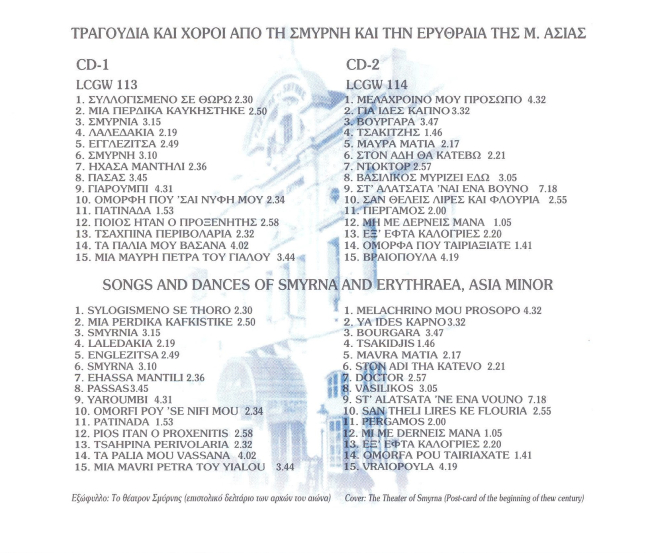
When one begins to remember Vourla, Cheshmé, Pergamos and fair Smyrna with her surrounding villages, one can go on and on; there is no end to the stories one can relate.
And, when one starts to sing their songs, bitterness and sorrow mingle with a lightening of the burden of the heart, as the feeling grows stronger and stronger that Greek Anatolia, tortured, oppressed and persecuted, still lives on, flowing in our blood, flesh of our flesh; lives on as a longing, a legend, a love, a song; lives on as a dance, a syrtos, a ballos, a karsilamas.
These records constitute a sequel to the disc “Songs and dances of Alatsata and Erythraea, Asia Minor” (LCGW 108), issued by the Lyceum Club of Greek Women, in 1992, and are the fruits of what has been for Theodore Kondaras a labour of love. Love for a homeland he can never for a moment forget, although he himself has not known it except through the tales told and retold by his father, his aunt, the women of his neighbourhood.
It is a love offering, too, from old-timers, such as Cleonike Tzoanaki, Ligheri Moustaki and Pandelis Politakis, but also from younger folk, such as Toula Sideri and the women of Nea Erythraea, who willingly and eagerly accepted to set down and record all that has been saved and cherished, in the way of the music and dance of the years of happiness and the years of sorrow. To all of these friends and collaborators go our heartfelt thanks.
Our most grateful thanks go, also, to a man who has dedicated his life to the preservation of our musical tradition, and who is always ready to offer his generous and unstinting help and the funds of his immense knowledge to those who go to him for counsel and guidance. We speak, of course, of Markos Ph. Dragoumis, of the Centre for Asia Minor Studies, whose advice, in the preparation of these two dics, has been inestimable.
When one begins to sing the songs of Anatolia, one finds it hard to stop. And so, in what we hope will be a not too distant future, our intent is to go on and tell you more.
June 1994
Lefteris Drandakis
CD-1 (New edition of LP LCGW 113)
1. Sylogismeno se thoro 2.30
2. Mia perdika kafkistike 2.50
3. Smyrnia 3.15
4. Laledakia 2.19
5. Englezitsa 2.49
6. Smyrna 3.10
7. Ehassa mantili 2.36
8. Passas 3.45
9. Yaroumbi 4.31
10. Omorfi pou 'se nifi mou 2.34
11. Patinada 1.53
12. Pios itan o proxenitis 2.58
13. Tsahpina perivolaria 2.32
14. Ta palia mou vassana 4.02
15. Mia mavri petra tou yialou 3.44
CD-2 (New edition of LP LCGW 114)
1. Melachrino mou prosopo 4.32
2. Ya ides kapno 3.32
3. Bourgara 3.47
4. Tsakidjis 1.46
5. Mavra matia 2.17
6. Ston Adi tha katevo 2.21
7. Doctor 2.57
8. Vasilikos 3.05
9. St' Alatsata 'ne ena vouno 7.18
10. San thelis lires ke flouria 2.55
11. Pergamos 2.00
12. Mi me dernis mana 1.05
13. Ex' efta kalogries 2.20
14. Omorfa pou tairiaxate 1.41
15. Vraiopoula 4.19
Violin: Giorgos Koros (Andronianoi, Euboea).
Kanonaki and santouri: Petros Tambouris (Athens, 1964).
Lute: Dimitris Kontoyiannis (Dauleia, Boeotia, 1951) and Christos Zotos (Kandila, Acarnania, 1937).
Toumbeleki and Tapsi: Pandelis Politakis (Nea Erythraea, 1934), Cleonike Tzoanaki (Chios, 1915) and Ligheri Moustaki (Nea Erythraea, 1924)
Singers:
Cleonike Tzoanaki, Ligheri Moustaki, Pandelis Politakis, Kyriakos Martakis, Vasso Georgatzi, Maria Tzoanaki, Stella Voyiatzi, Toula Sideri and group of women of Nea Erytrhaea, consituted by: Angeliki Pardali, Katerina Hadjianesti, Stavroula Vourgiotaki, Anna Drossou, Tassia Kondara, Maria Remoundou, Marianthe Menayia, Chryssa Madouroglou, Despina Moustaki and Marina Kallimani.
The recordings were made on the 27th June, 1992 and on the 14th November, 1993.
Recorded by: Yannis Sygletos




